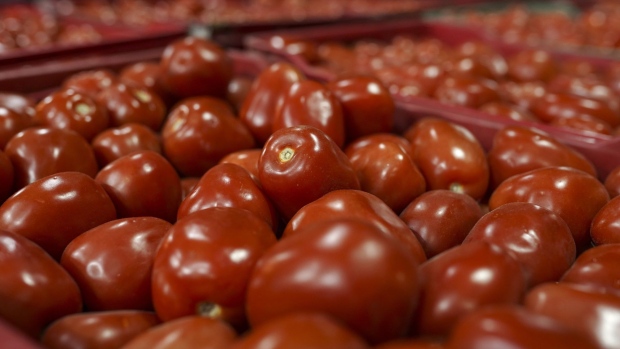Feb 21, 2023
Asda Rations Sales of Fruit and Vegetables After Widespread Shortages
, Bloomberg News

(Bloomberg) -- A major British grocer is rationing sales of fruit and vegetables after a bad harvest in southern Spain and north Africa led to gaps on supermarket shelves.
Asda, the UK’s third-largest grocer, has begun limiting purchases to three of each product across tomatoes, peppers, cucumbers, lettuce, salad bags, broccoli, cauliflower and raspberries.
Other retailers may follow suit after cold weather in key agricultural locations disrupted harvests, with the impact expected to last for weeks.
Shoppers in the UK have been posting pictures on social media of empty shelves in vegetable aisles across multiple supermarkets.
Grocers become more reliant on imports around this time of year, particularly from sunnier places such as Spain. British horticultural production normally only starts in late March or April and domestic supplies have already been hit by labor shortages and the higher cost of energy and fertilizer.
The supply of salad ingredients such as tomatoes and cucumbers is expected to fall to the lowest level since records began in 1985, according to the National Farmers’ Union.
“It is not sustainable for farmers and growers to continue to sell below the cost of production,” said NFU President Minette Batters, speaking at the group’s annual conference in Birmingham on Tuesday. She called for government support for farming in next month’s Budget.
Read More: Starmer Promises More Local Food on UK Tables to Woo Farmers
Catering supplier Reynolds said availability was low across glasshouse fruit and vegetables grown in Spain and Morocco — including tomatoes, peppers, cucumbers, chillies and courgettes. The company’s latest crop report shows amber or red status for these items. Cooler weather is causing produce to grow more slowly than usual and preventing it from ripening.
The problems have triggered shortages at supermarkets across northwest Europe, said Cindy van Rijswick, a senior analyst at Rabobank. “Probably somewhere in March, the production will be back to normal,” she said.
Glasshouses in countries like the Netherlands also curbed winter output due to high gas costs, Van Rijswick added.
Asda said it was having “sourcing challenges” from southern Spain and north Africa and that the limit is temporary to ensure availability for customers. Tesco Plc has also had supply chain problems for some tomatoes and peppers but doesn’t currently have any restrictions in place. There aren’t any limits at J Sainsbury Plc either.
“Disruption is expected to last a few weeks,” said Andrew Opie, director of food and sustainability at the British Retail Consortium. “Supermarkets are adept at managing supply chain issues and are working with farmers to ensure that customers are able to access a wide range of fresh produce.”
--With assistance from Agnieszka de Sousa and Megan Durisin.
(Updates with comment in ninth and 10th paragraphs.)
©2023 Bloomberg L.P.


